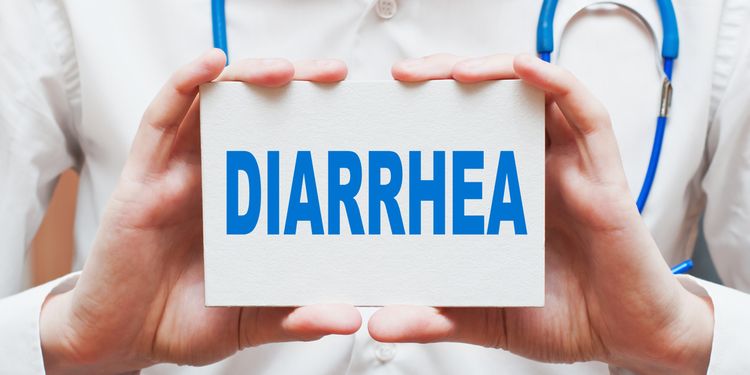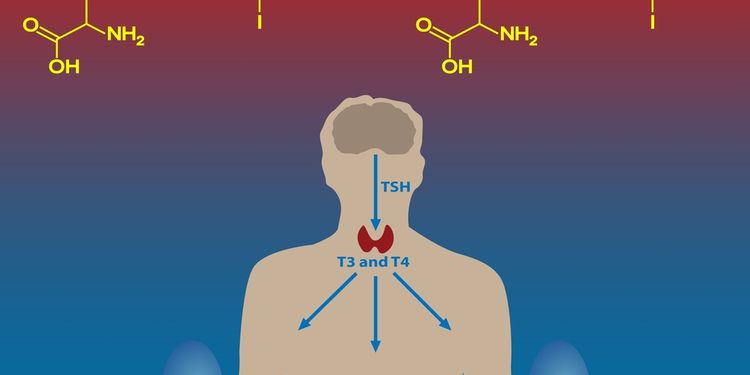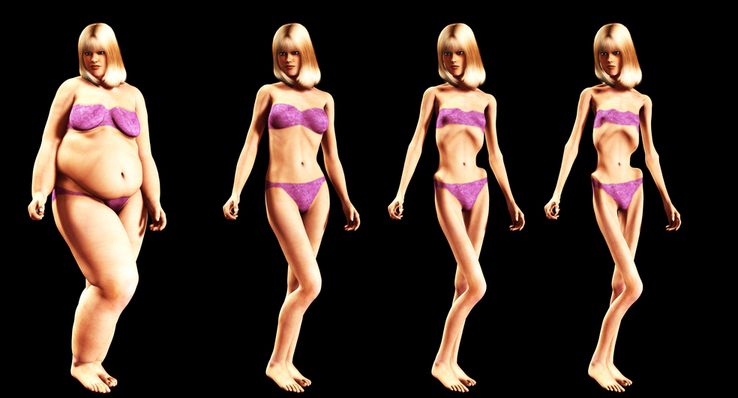What Your Unwanted Weight Loss Means and How To Gain Back The Weight

To a lot of people, the idea of weight loss without trying is like a dream come true. However, for anyone who’s had this sudden weight drop happen, it doesn’t feel quite right. In fact, it can feel downright awful. And it often indicates an underlying health issue.
This unwanted weight loss can be accompanied by a loss of energy and vitality, which is the opposite of how it should be. Typically you lose weight and feel great, plus have more energy—all of those good things we associate with weight loss.
Maybe you have a high metabolic rate with a slim, thin frame and it’s hard for you to gain weight. You’ve tried countless times, but no matter what you eat, it seems you just can’t put on weight.
There are a few reasons why naturally thin people are that way. It could be genetics or stronger satiety cues. Sometimes they just feel fuller faster, prompting them to eat less.1,2

Unchanged Habits, Weight Loss Ensues
Unwanted weight loss can occur without changing your eating habits or physical activity. It may occur following a loss of appetite or when you’re consuming the same amount and quality of food as you normally do but still lose weight. Either way, it can be a cause for concern.
Unwanted weight loss can be pretty disturbing, especially when you lose a fairly substantial amount and there’s no apparent reason for it. It could be a sign of a serious illness or disease, or it could be due to something more minor, such as a stomach virus.
At what point does this unexplained weight loss become a medical concern? Many medical professionals agree that an evaluation is called for if you unintentionally lose more than 5% of your body weight in six months to a year, especially if you’re an older adult.
To give you an example, a 5% weight loss if you’re 160 pounds, or 72 kilograms, would be eight pounds, or 3.6 kilograms. The medical term “cachexia” is used when weight loss is due to sickness. “Sarcopenia” is age-related weight loss that may start to occur as early as your 30s. These types of weight loss include loss of muscle as well as fat, which isn’t good since they’re both very important metabolically.
Why The Sudden Weight Loss?
Weight is affected by your calorie intake, degree of activity, stress levels, hormone balance and signaling, inflammation, genetics, age, and digestive function.
Unwanted weight loss is often seen in people with preexisting medical conditions. However, there are also short-term, acute illnesses where moderate to significant weight loss may occur.

How Does Unwanted Weight Loss Occur?
There could be several factors that govern the occurrence of unwanted weight loss. They are:
Compromised immune system: Arises when there’s a breakdown in your body’s ability to fight off illness. As a result there’s an underlying pathogenesis (development of disease) going on that may be responsible for the unwanted weight loss.
Depression: Can be an overriding factor for unwanted weight loss. Similarly, the loss of enthusiasm for life often leads to a loss of the desire to eat.
Genetics of a thin person: Certain people are predisposed toward being very thin.
Being significantly underweight has some negative health effects, such as lack of energy, nutritional deficiencies, weakened immune system, osteoporosis, and menstrual difficulties.4
As it turns out, according to a study published in the journal Nature, a duplication of chromosome sixteen may be the genetic explanation for being underweight.3
Approximately one in 2,000 people have this duplicated gene.

Symptoms of Unwanted Weight Loss
Weight loss tends to accompany a number of other symptoms, which vary depending on the underlying disease, disorder, or condition.
Symptoms that frequently affect digestion may also involve other parts of the body. Some gastrointestinal symptoms that may occur along with weight loss are:
- Abdominal bloating or pain5
- Bad breath6
- Chronic constipation7
- Dry mouth, loose or painful teeth8
- Loss of appetite9
- Nausea and vomiting10
- Puffy cheeks from swollen salivary glands11
- Severe or chronic diarrhea12
Other symptoms that may accompany unwanted weight loss include:
- Bloodshot eyes
- Bone or joint pain13
- Extreme temperature sensitivity14
- Fatigue15
- Frequent urination
- Loss of body fat16
- Loss of muscle mass, wasting of muscle, or muscle weakness16

Types of Unwanted Weight Loss
There are a few different types of unwanted weight loss, so understanding which type may be affecting you is the first step toward solving the problem.
Intentional: Significant weight loss can be the result of an eating disorder. This is seen, for example, in anorexic and bulimic individuals.
Because of neurotransmitter imbalances, hormonal imbalances, or unresolved emotional challenges, people suffering from body dysmorphic conditions may constantly do whatever it takes to keep losing weight.
Unintentional: This type of weight loss can happen because of a sickness or disease, such as an overactive thyroid, Addison’s disease, diabetes, and a host of other conditions or ailments.
Situational: Stressful situations such as the loss of a job, changing jobs, bereavement, divorce, and redundancy could bring on this type of weight loss. It’s usually temporary in nature, and weight will return to normal when the situation improves.
Pharmaceutical or substance abuse: Certain medications can cause you to lose weight. These include be anti-infective drugs such as Metronidazole, as well as many anti-cancer drugs, which suppress appetite.
Also in this category are bronchodilators that treat asthma, bronchitis, and emphysema, and even some cardiovascular drugs and stimulants. Drug addicts and alcoholics are often underweight because of poor eating habits.

Root Causes of Unwanted Weight Loss
Hiding underneath your thin frame lies the “why” of the weight loss puzzle. Some of these explanations include:
Gastrointestinal conditions such as peptic ulcers, ulcerative colitis, or Crohn’s disease.
Endocrine disorders such as Addison’s disease, diabetes, and hyperthyroidism.
Psychological troubles such as depression, bulimia, and anorexia.
Hidden food intolerances causing malabsorption are often at the root of unwanted weight loss, and diseases such as HIV/AIDS, congestive heart failure, and COPD are among many known disorders that cause weight disturbances, as are the medicines used to treat them. Cancer has its own separate category as a player in weight-related issues.
Similarly, alcohol and drug abuse have a way of hijacking our natural hunger and satiety signaling, and old age can often cause weight loss as taste buds dull. A lack of exercise decreases the need for caloric energy, so meals grow scant or even get skipped entirely.

Root Cause: Gastrointestinal Conditions
Crohn’s disease and ulcerative colitis are autoimmune diseases of the digestive tract and colon, respectively.
People with these conditions experience weight loss primarily because they take in fewer calories than their body needs; one of the symptoms of Crohn’s is severe abdominal pain, so you can probably understand why the desire to eat greatly diminishes.
There can be diarrhea connected with Crohn’s as well. People with Crohn’s disease often have poor appetite, fatigue, and weight loss.17
Ulcerative colitis is often discovered via bloody diarrhea, abdominal cramping, and even fever. Loss of appetite and weight loss often occur. Along with weight loss and loss of appetite, malnourishment is commonly seen because one’s digestive tract has lost its ability to metabolize the nutrients needed to thrive.

Root Cause: Endocrine Disorders
Endocrine disorders such as overactive thyroid are present in conditions like hyperthyroidism and Graves’ disease.
These are disorders that cause your metabolism to run too fast. Uncontrolled diabetes, adrenal fatigue, and Addison’s disease, where the adrenal axis produces an imbalanced ratio of hormones, are another set of endocrine problems that cause weight loss.
Hyperthyroidism occurs when too much T4 and/or T3 is produced. These are hormones that control how your cells use energy. A variety of conditions can cause hyperthyroidism, but Graves’ disease is the most common. It occurs more often in women than men and tends to run in families.
Graves’ is an autoimmune disorder in which antibodies stimulate the thyroid to secrete too much thyroid hormone. Some of the most prominent symptoms are weakness, irregular heartbeat, difficulty sleeping, itching, hair loss, nausea and vomiting, and unwanted weight loss.20

Diabetics can sometimes suffer from weight loss, and because we’re seeing an increase of Type 1 diabetes in adults, we can expect the trend of unwanted weight loss to continue to grow.21
Type 1 diabetes can occur at any age and results from autoimmune destruction of the pancreatic B-cells that produce insulin.22
When it occurs in adults, it’s often referred to as type 1.5 diabetes and can progress to total insulin deficiency at different rates.
Clinical features that may aid in the diagnosis of Type 1 diabetes include acute onset of polyuria (excessive urination) and polydipsia (excessive thirst), unintentional weight loss, and a personal or family history of autoimmune disorders.23
Addison’s disease is a rare chronic disease indicated by adrenal failure of the endocrine glands, brought on in most cases by autoimmune disorders, though infections and medications may also be to blame.
In autoimmune Addison’s, which mainly occurs in middle-aged females, the immune system gradually destroys the adrenal cortex—the outer layer of the adrenal glands.24
The most common symptoms are chronic, long-lasting fatigue, loss of appetite, weight loss, muscle weakness, and abdominal pain.

Root Cause: Hidden Food Intolerances
Having one food allergy is bad enough, but in many cases it’s not just one but several because of a phenomenon called cross-reactivity.
Cross-reactivity occurs when the proteins in one substance are similar enough to the proteins in another that your immune system sees them as the same. For example, it’s very common for people with Celiac or non-Celiac gluten sensitivity to also have lactose intolerance.25
Your immune system becomes hypervigilant and begins attacking itself; it’s like when the police rush to the scene of civil unrest but get confused about who the good guys and bad guys are, so they start shooting at the good guys.
The intestinal damage done in Celiac disease results in the microvilli, or “shag carpet” of the intestinal lining, getting completely worn down. When the intestinal lining is inflamed, the body becomes even more prone to food reactions and develops leaky gut, or intestinal permeability. Whole pieces of undigested food slip into the bloodstream, by-passing metabolism and causing malnourishment and weight loss.26

It’s also not uncommon to see people with Celiac disease who have a fructose intolerance. This would limit consumption of honey, fruits, fruit juices, many vegetables, sweet potatoes, and all forms of sugar and corn syrup.
Naturally, because many people consume these foods every day, a food intolerance to them could be slowly whittling away at their health.
The sooner you can diagnose hidden food allergies and remove them from your diet, the quicker you’ll be able to heal your gut and stop all the malabsorption.
According to the Sean N. Parker Center for Allergy Research at Stanford, an estimated seventeen to eighteen million known Americans suffer from food intolerances. It’s a diagnosis on the rise in developing and emerging economies as well.27 The eight major food allergens are dairy, eggs, peanuts, tree nuts, shellfish, gluten, and soy.

Root Cause: Diseases Causing Weight Loss
There are more than 80 diseases that can cause weight loss, but let’s take a look at just a few.
Chronic Obstructive Pulmonary Disease (COPD) is a group of lung diseases that block airflow, making breathing difficult. One of the classic symptoms is unexplained weight loss.
HIV/AIDS (Human Immunodeficiency Virus) is like all other viruses, except that our body is unable to flush it out. HIV destroys the immune system, so your body can’t fight infections and disease.
Because of the sudden wasting, diarrhea, coughing, and shortness of breath that result, sudden weight loss is inevitable.
Parkinson’s disease a progressive disease of the nervous system often preceded by weight loss for a variety of reasons, such as loss of taste and smell. However, as the disease progresses, it should level off unless there are other more serious medical issues such as cancer or depression going on.

Kidney disease comes with many different symptoms, several of which result in weight loss. Having a metallic taste in one’s mouth is very common; a build-up of wastes in the blood can make food taste different, so maybe you stop liking meat and you just don’t have the appetite you used to have.
This same build-up of wastes can cause nausea and vomiting, contributing to a loss of appetite and subsequent weight loss.
Congestive heart failure is documented in the European Heart Journal as having an important predictor—weight loss and leanness. The detection of weight change, and particularly weight loss, should be considered as an adverse sign prompting further evaluation.

Various forms of cancer, especially cancers of the intestinal tract, have a very debilitating effect on weight management.
Studies have shown that at the time of diagnosis, 80% of patients with upper gastrointestinal cancer and 60% of patients with lung cancer have already experienced significant weight loss.9
Anorexia—the loss of appetite or desire to eat—is typically present in fifteen to 25% of all cancer patients at diagnosis and may also occur as a side-effect of treatments. Anorexia is almost universally seen in individuals with widely metastatic disease.28
It can be exacerbated by chemotherapy and radiation therapy as taste and smells change and nausea and vomiting develop.29
Other causes of weight loss in cancer patients can stem from depression, loss of personal hope, and anxious thoughts. Then there’s cancer-related fatigue, malabsorption, and obstructions.
Anorexia can hasten the course of cachexia, or a progressive wasting syndrome manifested by weakness and the progressive loss of body weight, fat, and muscle. Cachexia is estimated to be the cause of death in 20% to 40% of cancer patients.29

Root Cause: Psychological Reasons
Anorexia nervosa and bulimia are serious, potentially life-threatening eating disorders characterized by self-starvation and excessive weight loss.
According to the National Eating Disorders Organization, approximately 90% to 95% of anorexia sufferers are female. Between 5-25% of individuals struggling with anorexia will die prematurely. The probability of death depends on the length of time you have the condition.
In both conditions, there’s a preoccupation with weight, food, calories, fat, grams, dieting, and exercise. Often there’s a denial of hunger. Food rituals are manifested—eating foods in a certain order, excessive chewing, and rearranging food on a plate are just a few examples. Sufferers usually offer consistent excuses with regard to mealtimes or situations involving food.
The body is denied the essential nutrients it needs to function normally, so it slows down all of its processes to conserve energy. This “slowing down” can have serious medical consequences, including an abnormally slowed heart rate, low blood pressure, reduction of bone density, muscle loss and weakness, and severe dehydration, which can result in kidney failure.30

Root Cause: Alcohol and Drug Abuse
There are approximately 17.6 million people who live with alcoholism in the US. It leads to troubling symptoms, one of which is weight loss. In severe cases of abuse, weight loss can be a prominent effect of the disease.
One of the main reasons for weight loss is the impact alcohol has on your body.
Alcohol in the stomach may trigger satiety, causing less food to be consumed and thus reducing nutrient intake. Stomach acid production goes into overdrive, leading to dyspepsia and vomiting or an upset stomach, not to mention the significant damage your liver takes from both the alcohol and the weight loss.

Up until recently, it has been thought that cocaine users have a suppressed appetite, thereby contributing to weight loss.
However, a recent study suggests that shedding those pounds actually has to do with a decrease in leptin—the master hormone that regulates appetite and energy expenditure.31
Heroin, crack, methamphetamines, and other stimulants suppress appetite and speed up metabolism. Barbiturates, tranquilizers, and hallucinogens all have an impairing effect on appetite, rendering the abuser disinterested in food.

Root Cause: Medications
Medications can have a myriad of effects on food perception and unwanted weight loss.
There are certain drugs that alter the sense of taste and/or smell, such as ACE inhibitors, calcium channel blockers, levodopa, and aldactone.
Then there’s a group of drugs that cause dry mouth, like antihistamines, clonidine, and loop diuretics. Many drugs suppress the appetite or may have side effects such as difficulty or discomfort when swallowing. It comes as no surprise, then, that people plagued with these effects lose their desire or ability to eat wholesome, hearty meals.

Natural Relief from Unwanted Weight Loss
Food journaling: Beginning the journey of weight gain should start with keeping a food journal.
It doesn’t have to be complex or a big deal, but it will make you much more aware of what you’re eating, and you’ll have a better chance of knowing what’s working and what’s not.
Online programs like MyFitnessPal and Fitday can make tracking very easy, and you can track your actual weight there as well.
Calorie intake: Try adding an extra 200 calories of quality food per day to start. You can adjust up or down depending on the results.
Quality over quantity: Healthy weight gain isn’t just more burgers, fried chicken, or milkshakes at the drive thru. Instead, choose nutrient-dense foods from all food groups. Some great choices would be seafood, coconut oil, avocados, vegetables, and pastured animal proteins.

Eat snacks between meals: Beef jerky, nut butters with apple slices, yogurt, nuts, sliced vegetables, hummus, and guacamole are excellent options.
Drink your calories: Smoothies, healthy shakes made with protein, coconut milk, vegetables, and green/red powders that are loaded with fruits and berries can replace soda between meals.
A good habit to begin is not to drink while you’re eating. It impairs digestion and nutrient delivery, and it might make you eat less solid food.
Midnight munchies: Eating a light snack before you go to sleep is completely permissible.
Set your goals and be patient: Just like weight loss, weight gain is a process that will take time. In fact, depending on how much you need to gain, it could take a few years.
However, you’ll be pleased with the increased energy, increased appetite, stabilized hunger patterns, and overall better health along the way. Also take stock in how your appearance is changing. Buy new clothes to fit the new you and feel good about what you’ve achieved!

Exercise: While you’re putting weight on, it’s important to keep exercising so the extra weight can be nicely toned.
Good fats rule: Real butter, ghee, coconut oil, full-fat coconut milk, full-fat yogurt and kefir, triple cream cheeses (as long as you can handle the lactose), and dark chocolate are some of life’s pleasures you should embrace.
Use coconut oil, butter, and ghee when you cook. Smoothies are great with full-fat coconut milk as well as yogurt and kefir.
Meditation, grounding, and forest bathing: Slowing down and connecting with nature does a soul good. It’s that reset button that has the potential to bring you into balance internally. Never underestimate the power of this.
Let’s face it—it’s unnerving to be dealing with unwanted weight loss, and the tendency is to worry, be nervous, and possibly get depressed because of it. Those with depression improve when they get their hands dirty—literally.
In March 2007 in the peer-reviewed journal Neuroscience, researchers submitted an article on antidepressant microbes in the soil. The microbes, M. vaccae to be exact, trigger the production of immune cells that curb the inflammation that’s caused by depression, allergies, and a host of other disorders.
